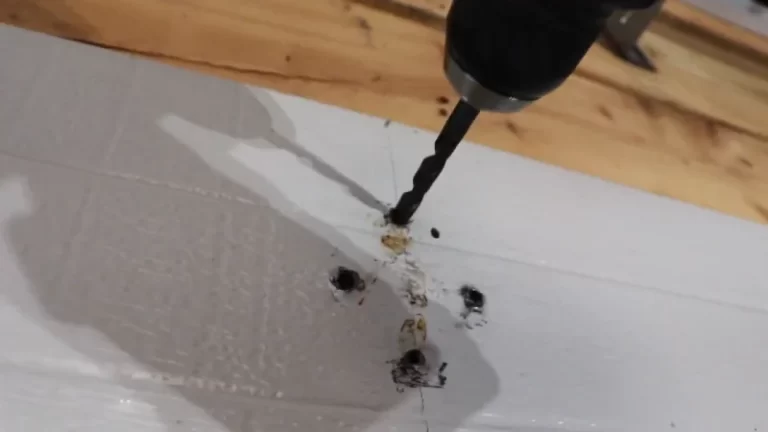Garage Smells Like Rotten Eggs? 5 Urgent Causes to Check Now!
You walk into your garage and it hits you: a powerful, foul smell of rotten eggs. Your first instinct might be to ignore it, but this is one odor you absolutely cannot afford to overlook.
That sulfur-like smell is a major red flag. It often signals a serious hazard that could threaten your property and your family’s safety.
This guide will walk you through the most common culprits behind that rotten egg smell, from the imminently dangerous to the surprisingly simple. We’ll help you diagnose the source and give you clear, actionable steps to resolve it quickly and safely.
You'll Learn About
Immediate Danger: Could It Be a Gas Leak?
Let’s address the most critical possibility first. That distinct rotten egg odor is intentionally added to natural gas and propane to serve as a warning sign for a leak.
Natural gas itself is odorless and invisible. Utility companies add a chemical called mercaptan, which contains sulfur, to make leaks detectable by smell. If you have any gas-powered appliances in your garage, such as a water heater, furnace, or dryer, a leak is a primary suspect.
What to Do If You Suspect a Gas Leak
If you smell rotten eggs and suspect a gas leak, you must act immediately. This is a potentially life-threatening situation that can lead to a fire or explosion.
Follow these steps without delay:
1. Do Not Touch Anything Electrical: Do not turn any lights on or off. Do not use your garage door opener, and don’t unplug any appliances. Even a tiny spark from a switch can ignite the gas. It’s crucial to avoid creating any potential ignition source, which is why you should also be aware of issues like a Glade plug-in smoking, as any malfunctioning electrical device is a risk.
2. Extinguish All Flames: Immediately put out any open flames, including cigarettes or candles.
3. Evacuate Immediately: Get everyone out of the house and garage right away. Leave the door open on your way out to help with ventilation.
4. Call for Help from a Safe Distance: Once you are a safe distance away from your home (at a neighbor’s house or down the street), call your gas utility’s emergency number or 911. Do not use your cell phone or landline inside your home.
Gas company technicians will arrive quickly to shut off the gas and pinpoint the source of the leak. Do not re-enter your home until they have declared it safe.
Source #2: Sewer Gas Intruding Your Space
If you’ve ruled out a gas leak, the next likely culprit is sewer gas. This is a complex mixture of gases created by the decomposition of waste, and it contains hydrogen sulfide—the chemical famous for its potent rotten egg smell.
Sewer gas isn’t just unpleasant; it can also be harmful to your health, causing headaches, dizziness, and other symptoms with prolonged exposure. It typically finds its way into your garage through the plumbing system.
Common Plumbing Issues Causing Sewer Gas Leaks
There are a few common reasons why sewer gas might be escaping into your garage:
A Dry P-Trap: Most garage floor drains have a U-shaped pipe called a P-trap. This trap is designed to hold a small amount of water, which creates a seal that blocks sewer gas from coming up the drain.
If the drain isn’t used often, this water can evaporate, breaking the seal and allowing gas to escape. This is the most common and easiest-to-fix cause of sewer gas odor.
The Solution: Simply pour a gallon of water down the floor drain to refill the P-trap. To slow down future evaporation, you can add a few tablespoons of mineral oil or cooking oil on top of the water.
Blocked Plumbing Vents: Your home’s plumbing system has vents that run through the roof. These vents equalize pressure and allow sewer gas to escape harmlessly outside. If a vent becomes clogged with leaves, debris, or a bird’s nest, the gas can get forced back into the house through your drains.
The Solution: You may be able to visually inspect the vents from the ground. If you suspect a blockage, it’s safest to call a professional plumber to clear the line, as it often requires getting on the roof.

Source #3: Your Water Heater is Crying for Help
Does the rotten egg smell appear strongest when you use hot water in a nearby utility sink? If so, your water heater is likely the source of the problem. This is a very common issue, especially for homes with well water.
The smell comes from a chemical reaction inside the tank. It involves three key elements: sulfates in the water, certain types of bacteria, and the water heater’s “sacrificial” anode rod.
The anode rod is a metal rod, typically made of aluminum or magnesium, that sits inside the tank. Its job is to corrode away over time, protecting the steel tank from rust. However, when the rod interacts with sulfates and bacteria, it can produce hydrogen sulfide gas, infusing your hot water with that terrible sulfur smell.
How to Deodorize Your Water Heater
First, confirm the source by checking if only your hot water smells. If both cold and hot water smell, the problem is with your water supply itself. If it’s just the hot water, you can take these steps:
1. Flush the Water Heater: Draining and flushing the tank can help remove the bacteria and sediment that contribute to the smell. This is good routine maintenance to extend the life of your unit.
2. Replace the Anode Rod: If you have a magnesium or aluminum rod, switching to a zinc-aluminum anode rod can solve the problem. Zinc counteracts the chemical reaction that produces the smelly gas.
3. Disinfect the System: For persistent problems, a plumber can temporarily disinfect the tank and your pipes using a solution of hydrogen peroxide. This is best left to professionals for safety reasons.
Source #4: A Dangerous Car Battery Problem
Another potential source of a sulfur smell in the garage is a car battery. Standard lead-acid car batteries contain sulfuric acid. If the battery is overcharging, short-circuiting, or has reached the end of its life, it can overheat.
When this happens, the sulfuric acid can begin to boil and break down, releasing hydrogen sulfide gas. This is not only smelly but also very dangerous.
Signs of a Malfunctioning Battery
Look for these signs if you suspect your car battery is the issue:
- The smell is strongest near your car.
- The battery case feels hot to the touch.
- The sides of the battery are swollen or bulging.
- You can see fluid leaking from the battery case.
Do not attempt to drive a car with a hot, smoking, or bulging battery. The leaking fluid is corrosive, and the gases are flammable. It’s best to call a mechanic for assistance to safely inspect your vehicle’s charging system and replace the faulty battery.
Quick Diagnosis Table: Find Your Smell’s Source
Use this table to quickly narrow down the potential cause of the rotten egg smell in your garage based on the specific symptoms you’re experiencing.
| Potential Cause | Key Symptoms | First Action to Take |
|---|---|---|
| Natural Gas Leak | Smell is constant, may be accompanied by a hissing sound. Present near gas appliances. | Evacuate immediately. Call your gas utility from a safe location. |
| Sewer Gas (Dry P-Trap) | Smell is coming from a floor drain. Garage is not used often. | Pour a gallon of water into the floor drain. |
| Water Heater Issue | Smell is noticeable only when using hot water. | Confirm only hot water smells, then consider flushing the tank or calling a plumber. |
| Overcharging Car Battery | Smell is concentrated around your car. Battery case may be hot or swollen. | Do not start the car. Have a mechanic inspect the battery and charging system. |
| Other Organic Material | Smell is localized to a specific area, like a trash can or storage shelf. | Conduct a thorough search and deep clean of the garage. |
Source #5: Less Common Culprits to Investigate
If you’ve investigated the major causes and still haven’t found the source, it’s time to do some deep cleaning and detective work. Sometimes the cause can be much simpler, hiding in plain sight.
Check for rotting organic material, such as a forgotten bag of garbage, rotting produce like potatoes, or even a dead rodent trapped in a wall or corner. These can all produce hydrogen sulfide and other foul-smelling gases as they decompose. Problems can sometimes hide in unseen places, which is why maintaining your home’s envelope, including having no exposed garage ceiling insulation, is important for preventing pest intrusion.
Your Final Checklist for a Fresh Garage
If the smell persists, take a systematic approach:
1. Empty and Clean: Remove everything you can from the garage. Thoroughly sweep and mop the floor.
2. Check Storage: Inspect all stored items, including bags of fertilizer, soil, or chemicals that may have degraded over time.
3. Ventilate: Open your garage door and any windows for several hours to completely air out the space.
Maintaining your entire home, from the garage to the attic, is the best way to prevent surprise issues. A holistic approach to upkeep, even including things you might not think about like proper closet insulation, contributes to a safer and more efficient home environment.
Conclusion: Don’t Ignore That Smell
A rotten egg smell in your garage is a serious warning sign that should never be ignored. While it could be as simple as a dry drain trap, it could also be as dangerous as an explosive gas leak or a malfunctioning car battery.
Always start by addressing the most hazardous possibility—a gas leak—and take immediate safety precautions. By working through the potential causes methodically, from gas lines to plumbing and appliances, you can identify the source and take the necessary steps to restore safety and freshness to your garage.

